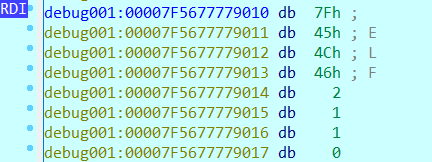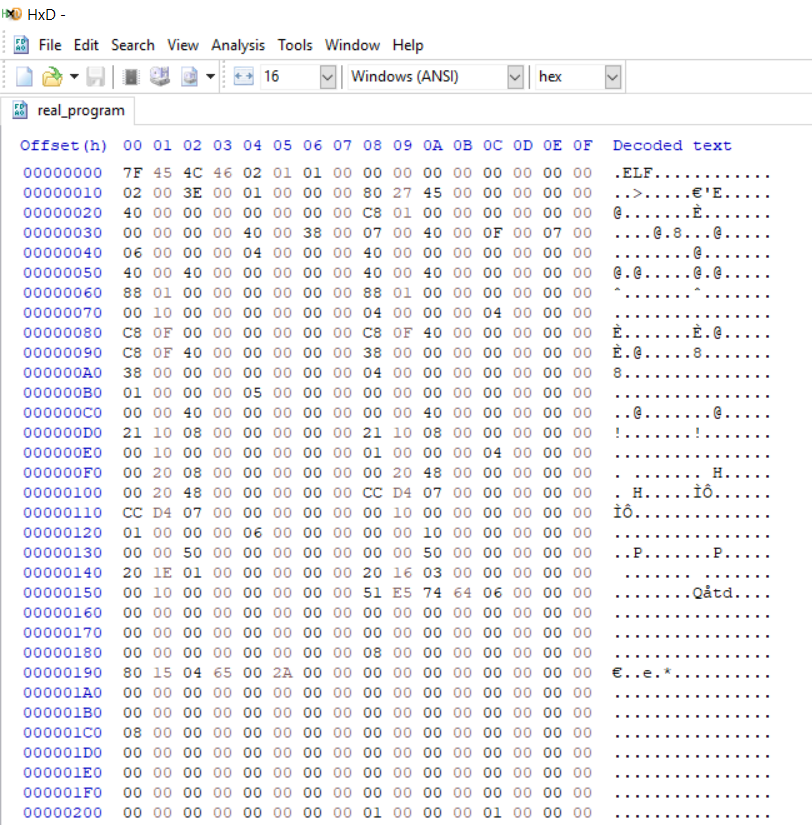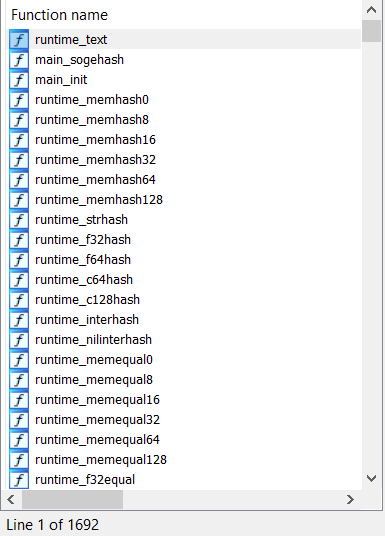Sogeti Qualif - reverse - Be3rP4ck
RE: Be3rP4ck [ 495 points ] (Author: AK)
This is a 64-bit ELF file.
$ file Be3rP4ck
Be3rP4ck: ELF 64-bit LSB executable, x86-64, version 1 (SYSV), dynamically linked, interpreter /lib64/ld-linux-x86-64.so.2, for GNU/Linux 2.6.32, BuildID[sha1]=da32e0c02e1bf1f0afd1c005b3d4fb86b23840b8, not stripped
Misleading flag
After launching the program, it asks us to enter the flag, and if it’s wrong, nothing would happen:
$ ./Be3rP4ck
Flag: test
Let’s analyze the main function.

The user input is stored in [rbp+string]. The program performs several operations on our input: a xor with 0x87 and 4 not. Finally it is compared with the value stored at unk_401210.
So, to recover the flag, I just xored the data in unk_401210 with 0x87.
unk_401210 = [0xc9, 0xb7, 0xf3, 0xd8, 0xd3, 0xef, 0xb4, 0xd8, 0xe1, 0xeb, 0xb3, 0xc0, 0xc0, 0xc0, 0xc0, 0xc0]
print(''.join([chr(x^0x87) for x in unk_401210]))
And I got N0t_Th3_fl4GGGGG.
$ ./Be3rP4ck
Flag:N0t_Th3_fl4GGGGG
Well... played?
Unpacking the program
I noticed that if I pass an argument to the program, it will print another message that corresponds to the real program, which is packed:
$ ./Be3rP4ck test
-- Real program --
Give me the real flag
Indeed, the program doesn’t start on main but on another function called main_0. This function checks if argc is equal to 2, if not, it will call main.
.text:0000000000400C45 ; int __cdecl main_0(int, char **, char **)
.text:0000000000400C45 ; __unwind {
.text:0000000000400C45 push rbp
.text:0000000000400C46 mov rbp, rsp
.text:0000000000400C49 sub rsp, 10h
.text:0000000000400C4D mov [rbp-4], edi
.text:0000000000400C50 mov [rbp-10h], rsi
.text:0000000000400C54 cmp dword ptr [rbp-4], 2 ; [rbp-4] contains argc
.text:0000000000400C58 jz short loc_400C7B ; jump if argc = 2
.text:0000000000400C5A call main
...
If an argument is given, we arrive on the function fetch_data. This is the function used to unpack the hidden program.
...
.text:0000000000400EB0 loc_400EB0:
.text:0000000000400EB0 add [r8+48h], bl
.text:0000000000400EB4 mov eax, [rbp-40h] ; [rbp-40h] contains rsi, ie argv
.text:0000000000400EB7 lea rsi, aRb ; "rb"
.text:0000000000400EBE mov rdi, rax ; argv[0]: "Be3rP4ck"
.text:0000000000400EC1 call _fopen
.text:0000000000400EC6 mov [rbp-18h], rax
.text:0000000000400ECA cmp qword ptr [rbp-18h], 0
.text:0000000000400ECF jnz short loc_400EE7
.text:0000000000400ED1 lea rdi, aFuck ; "fuck"
.text:0000000000400ED8 call _perror
.text:0000000000400EDD mov eax, 0FFFFFFFFh
.text:0000000000400EE2 jmp locret_400F93
.text:0000000000400EE7 ; ---------------------------------------------------------------------------
.text:0000000000400EE7
.text:0000000000400EE7 loc_400EE7:
.text:0000000000400EE7 mov rax, [rbp-18h]
.text:0000000000400EEB mov edx, 0
.text:0000000000400EF0 mov esi, 1
.text:0000000000400EF5 mov rdi, rax
.text:0000000000400EF8 call _fseek
.text:0000000000400EFD mov rdx, [rbp-18h]
.text:0000000000400F01 lea rax, [rbp-2Ah]
.text:0000000000400F05 mov rcx, rdx
.text:0000000000400F08 mov edx, 3
.text:0000000000400F0D mov esi, 1
.text:0000000000400F12 mov rdi, rax
.text:0000000000400F15 call _fread
.text:0000000000400F1A mov eax, 1
.text:0000000000400F1F push rax
.text:0000000000400F20 xor eax, eax
.text:0000000000400F22 jz short near ptr loc_400F33+2
...
.text:0000000000400F33 loc_400F33:
.text:0000000000400F33 add [r8+48h], bl
.text:0000000000400F37 mov eax, [rbp-18h]
.text:0000000000400F3A mov rdi, rax
.text:0000000000400F3D call _fclose
.text:0000000000400F42 mov rsi, [rbp-20h] ; 0x13455C
.text:0000000000400F46 lea rdx, [rbp-2Ah]
.text:0000000000400F4A mov rax, [rbp-8]
.text:0000000000400F4E mov ecx, 3
.text:0000000000400F53 mov rdi, rax
.text:0000000000400F56 call mb_xor
.text:0000000000400F5B mov eax, 1
...
I put a breakpoint at 0x400F56 call mb_xor and I noticed that rdi contains the chars “ELF” after executing this instruction.

So I copied the 0x13455c bytes of data (size in rsi) stored at the address contained in rdi and I pasted it in a hexadecimal editor called HxD.

After saving it, I got a new ELF which corresponds to the real program.
$ file real_program
real_program: ELF 64-bit LSB executable, x86-64, version 1 (SYSV), statically linked, Go BuildID=b5b5bb9544aeca5d8e3dd360bad2dfb3f9d87aacA, not stripped
PS: The extracted program can be executed with 2 arguments.
Analysing the real program
It’s a program written in Go. The main.main function is called runtime_text here.

After examining this function, I noticed that if I enter “almost_it”, it would print another wrong flag…
.text:000000000040126B loc_40126B:
.text:000000000040126B mov [rsp+0B8h+var_B8], rcx
.text:000000000040126F mov [rsp+0B8h+var_B0], rax
.text:0000000000401274 lea rax, unk_4ADCBF ; "almost_it"
.text:000000000040127B mov [rsp+0B8h+var_A8], rax
.text:0000000000401280 mov qword ptr [rsp+0B8h+var_A0], 9
.text:0000000000401289 call runtime_eqstring
.text:000000000040128E movzx eax, byte ptr [rsp+0B8h+var_A0+8]
.text:0000000000401293 test al, al
.text:0000000000401295 jnz short loc_40129C ; print a wrong flag
$ ./Be3rP4ck almost_it
-- Real program --
flag is: Y0u_A1nt_Th3r3_Y3t
Then, the program does a custom hash on our input using the function main_sogehash. And its final value is compared to 1f4e509605c9f4bf22f4bf22a5c9fe23bbfee5dd22ffdde5fb22aafedcdd22f5f1d6f0a4a5a589.
.text:000000000040118E call main_sogehash
.text:0000000000401193 mov rax, [rsp+0B8h+var_A8]
.text:0000000000401198 mov rcx, qword ptr [rsp+0B8h+var_A0]
.text:000000000040119D cmp rcx, 4Eh ; length
.text:00000000004011A1 jz short loc_4011B3
...
.text:00000000004011B3 loc_4011B3:
.text:00000000004011B3 mov [rsp+0B8h+var_B8], rax
.text:00000000004011B7 mov [rsp+0B8h+var_B0], rcx
.text:00000000004011BC lea rax, unk_4B3F03 ; "1f4e509605c9f4bf22f4bf22a5c9fe23bbfee5dd22ffdde5fb22aafedcdd22f5f1d6f0a4a5a589"
.text:00000000004011C3 mov [rsp+0B8h+var_A8], rax
.text:00000000004011C8 mov qword ptr [rsp+0B8h+var_A0], 4Eh
.text:00000000004011D1 call runtime_eqstring
Cracking the hash
After analyzing the main_sogehash, I wrote this little python script to bruteforce the hash.
target = '1f4e509605c9f4bf22f4bf22a5c9fe23bbfee5dd22ffdde5fb22aafedcdd22f5f1d6f0a4a5a589'
alphabet = 'abcdefghijklmnopqrstuvwxyzABCDEFGHIJKLMNOPQRSTUVWXYZ!_{}0123456789'
flag = ''
d = 0
for i in range(0, 78, 2):
for s in alphabet:
x = d^ord(s)^4*ord(s)
if hex(x)[-2:] == target[i:i+2]:
flag += s
d = x >> 8
break
print(flag)
$ ./Be3rP4ck SCE{Th1s_1s_th3_r3al_fl4g_w3ll_d0ne\!\!\!}
-- Real program --
Give me the real flag
Congratulations, you can use this flag to validate :)
Finally, the flag is:
SCE{Th1s_1s_th3_r3al_fl4g_w3ll_d0ne!!!}